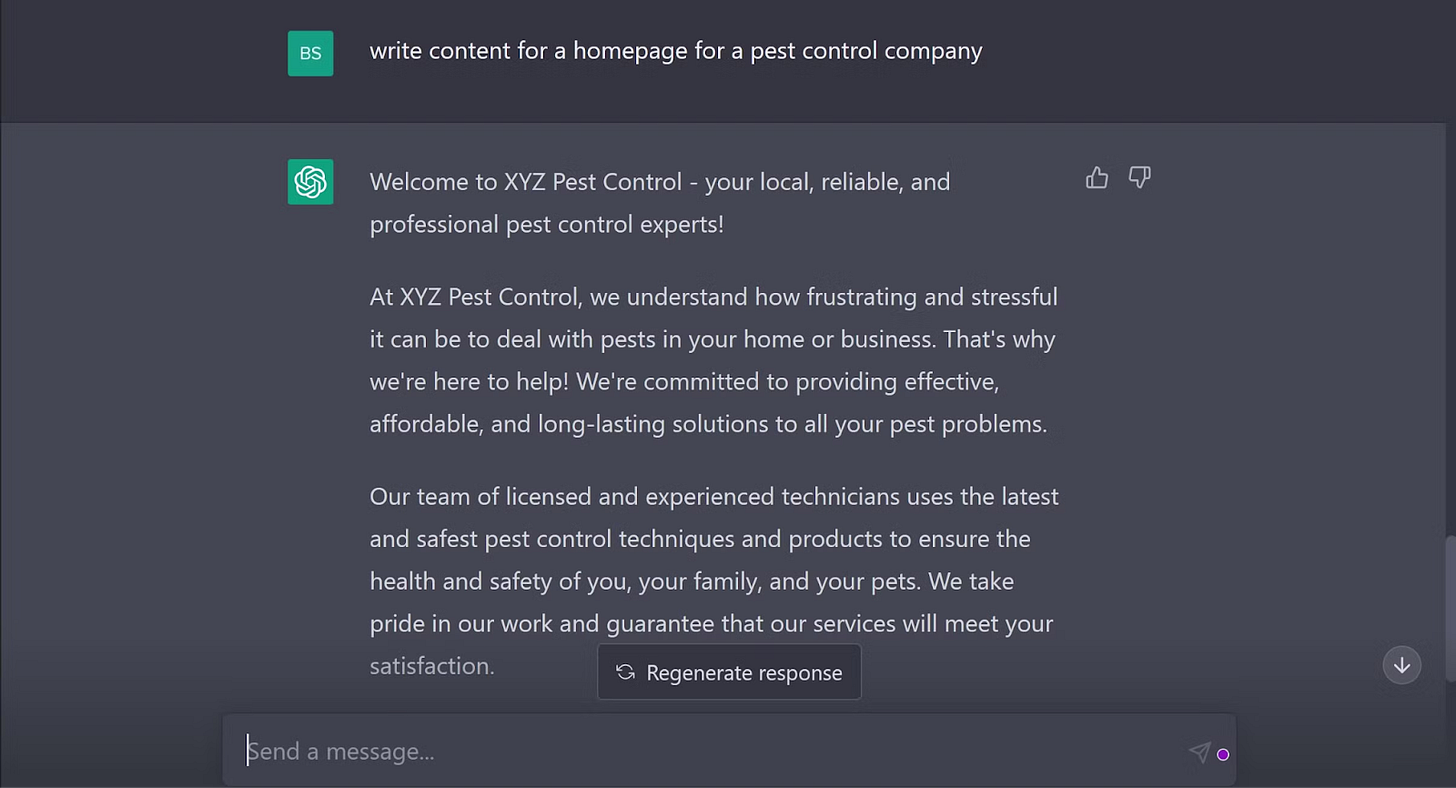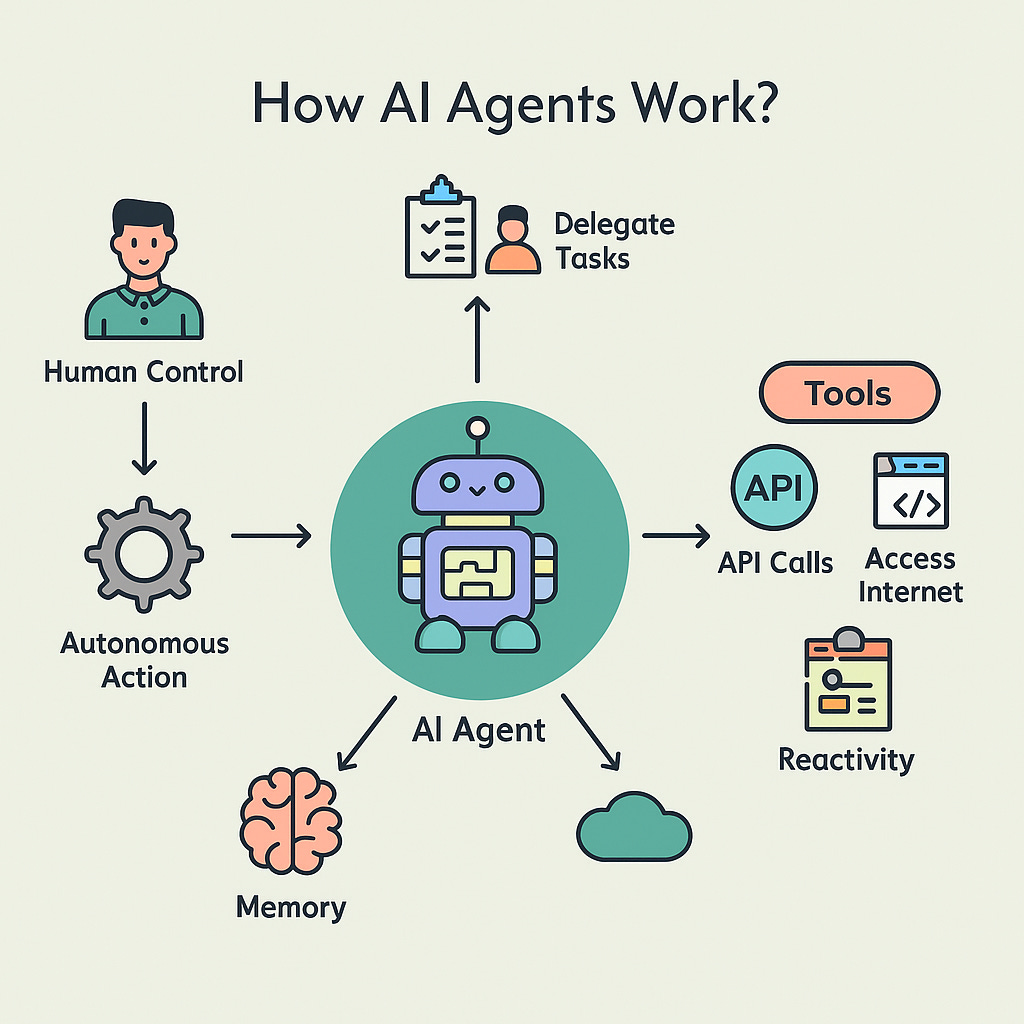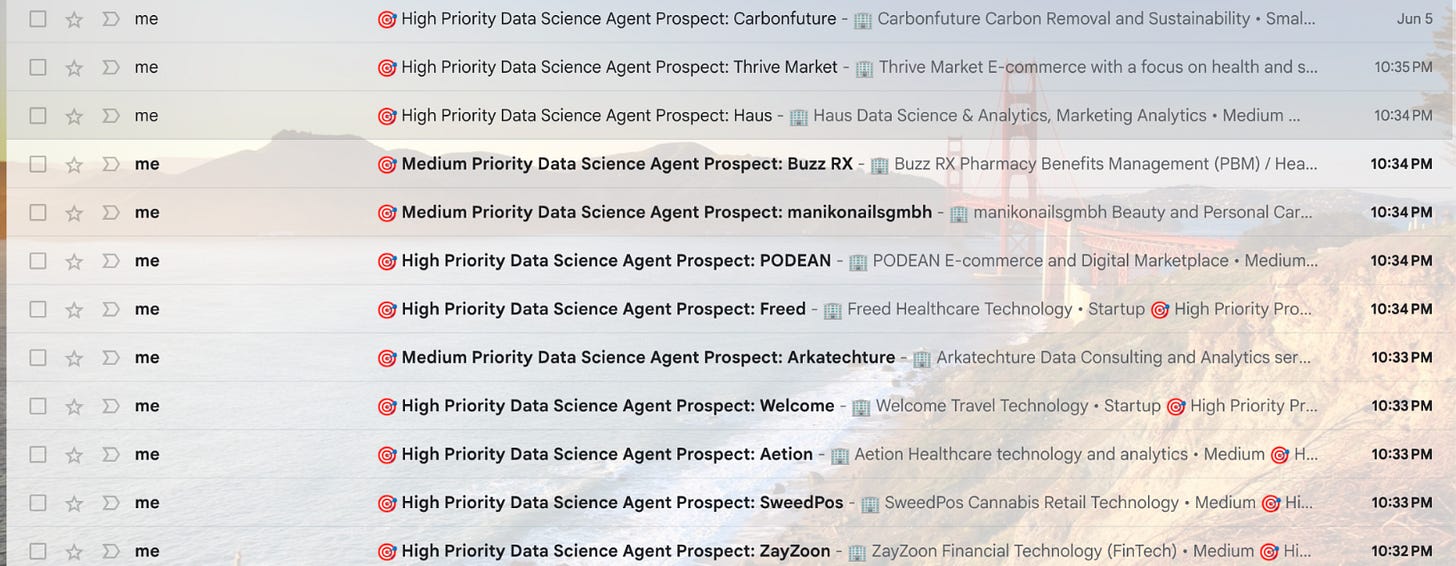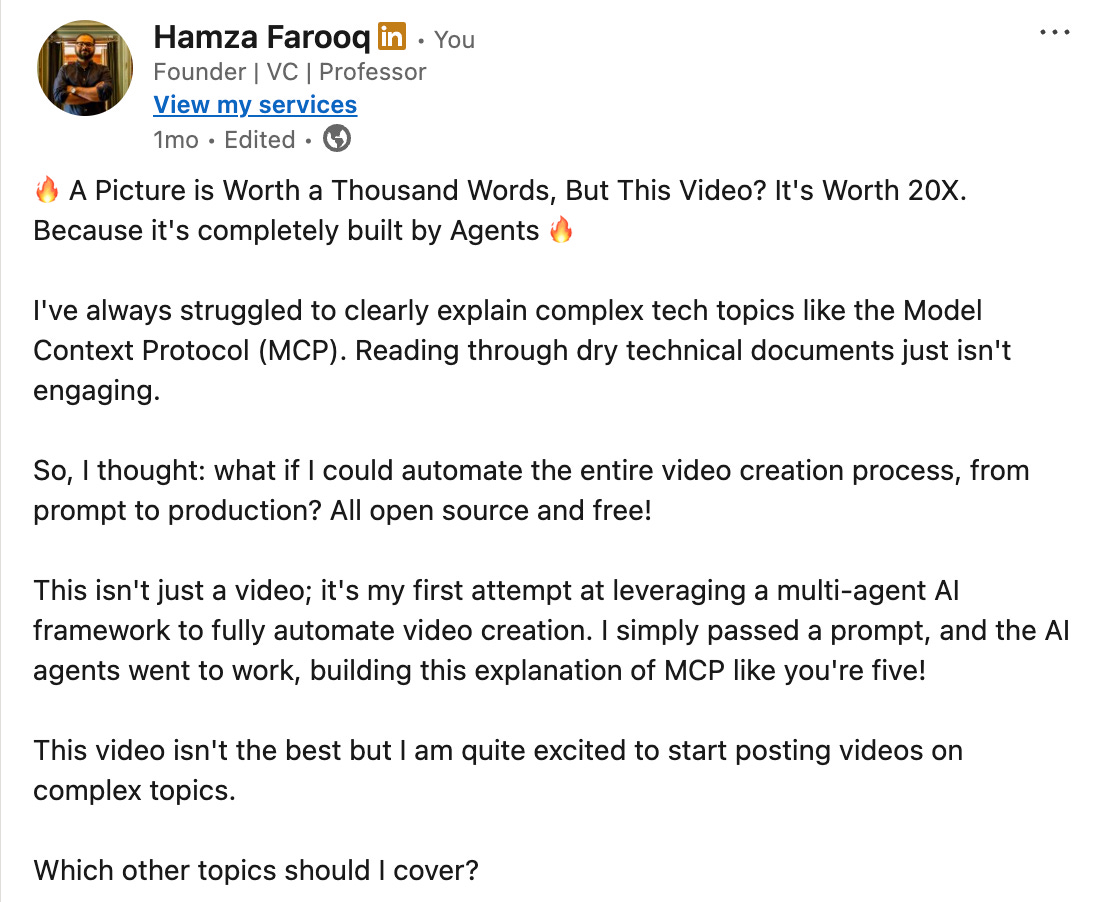🚀 Agents in Action: From LLMs to AI Agents
The rise of Agents from mere LLMs!
Hi there!
My name is Hamza, and I am so excited to welcome you to our transformative 10-day course on AI agents! Joining me throughout this journey is my cohort Bhavna, our resident AI expert at Traversaal.ai
In these 10 sessions, we'll uncover everything about AI agents—what they truly are, how they actually work, and what's really behind all this hype. We'll move beyond the buzzwords and build practical, enterprise-ready AI agents that can work alongside humans as genuine digital colleagues.
🎯 What You'll Master Today
By the end of today's lesson, you'll have a comprehensive understanding of:
✨ LLM Fundamentals: How large language models work and their limitations as standalone systems
🧠 Agent Architecture: The three core components that transform LLMs into agents
📈 Maturity Levels: The four stages of agent evolution and when to use each
🛠️ Practical Applications: Real-world examples of agents driving business value
🔄 Planning Loops: How agents think, act, and learn from their experiences
💡 Strategic Thinking: How to identify agent opportunities in your own work or organization
Over the past year, tools like ChatGPT have revolutionized how we interact with AI. They can generate text, answer complex questions, write code, and even engage in sophisticated conversations. But here's the thing, they're fundamentally reactive. They wait for us to prompt them, respond brilliantly, and then... wait again.
They're like having an incredibly knowledgeable consultant who only speaks when spoken to and forgets everything the moment the conversation ends.
That's where AI agents change everything.
🤖 What Exactly Is an AI Agent?
At its core, an AI agent is an LLM with access to tools, but that simple definition understates a profound shift in capability. Think of it this way: if an LLM is like a brilliant scholar locked in a library with no phone, no internet, and no way to affect the outside world, then an AI agent is that same scholar given a smartphone, a credit card, access to APIs, and the ability to take actions in the real world.
But it's not just about tools. AI agents represent a fundamental evolution in how we think about AI systems. They transform passive responders into proactive digital workers that can:
Remember conversations and context across time
Use tools to interact with real-world systems, APIs, and databases
Plan and execute multi-step workflows
Learn and adapt from their actions and mistakes
Collaborate with other agents and humans
The magic happens when we combine these capabilities. An LLM might tell you how to book a flight; an AI agent actually books it, adds it to your calendar, sends confirmations to relevant parties, and sets up reminders, all while remembering your preferences for future trips.
🧠 The Three Pillars That Transform LLMs into Agents
1. 🧠 Memory: The Foundation of Continuity
Traditional LLMs reside in the eternal present; each conversation begins anew. AI agents, however, maintain different types of memory:
Conversational Memory: Remembering what you discussed yesterday or last week
Procedural Memory: Learning your preferences and workflows over time
Knowledge Memory: Building and updating their understanding of your domain
Episodic Memory: Recalling specific events and outcomes from past actions
This memory isn't just storage; it's the foundation of relationship-building between humans and AI.
2. 🛠️ Tools: The Bridge to Reality
Tools are what transform an AI from a conversationalist into a digital worker. These can include:
API Integrations: Connecting to Slack, Salesforce, Google Workspace, or proprietary systems
Code Execution: Running Python scripts, SQL queries, or data analysis
File Operations: Reading, writing, and manipulating documents and databases
Web Interactions: Browsing, scraping, and gathering real-time information
Communication Tools: Sending emails, messages, or notifications
The key insight is that tools aren't just add-ons, they're the agent's hands and eyes in the digital world.
3. 🔄 Planning Loops: The Engine of Intelligence
This is where the real magic happens. Instead of generating a single response, agents operate in continuous Think → Act → Observe → Reflect cycles:
Think: Analyze the current situation and plan the next step
Act: Execute an action using available tools
Observe: Process the results and feedback
Reflect: Learn from outcomes and adjust future actions
This loop enables agents to tackle complex, multi-step tasks that would overwhelm traditional LLMs.
📊 The Four Levels of AI Agent Evolution
Understanding these levels will help you choose the right approach for your specific use cases:
Level 1: Simple LLMs
The Foundation
These are your standard chatbots, sophisticated text generators that excel at conversation but can't take actions. They're perfect for:
Customer service queries
Content generation
Educational tutoring
Creative writing assistance
When to use: When you need intelligent conversation without external actions.
Level 2: LLMs with Tools
The Specialists
LLMs connected to specific, predefined tools and APIs. They can fetch weather data, send calendar invites, query databases, or integrate with specific software platforms.
Example workflow:
User: "Schedule a meeting with the marketing team for next Tuesday"
Agent: → Checks calendar API → Finds available slots → Sends invites → Confirms booking
When to use: For specific, well-defined tasks within known systems.
Level 3: ReAct Agents (Reasoning + Acting)
The Thinkers
These agents implement the "Think, Act, Observe, Reflect" loop, allowing them to tackle complex, multi-step problems dynamically. They can plan, execute, learn from mistakes, and adapt their approach in real-time.
Example workflow:
User: "Research our top 3 competitors and create a comparison report"
Agent thinks: "I need to identify competitors, research each one, and compile findings"
→ Searches web for competitor information
→ Observes: Found basic info but need financial data
→ Thinks: "Let me check financial databases"
→ Queries financial APIs
→ Observes: Got financial data but missing recent news
→ Searches recent news articles
→ Compiles comprehensive comparison report
When to use: For complex, undefined problems requiring planning and adaptation.
Level 4: Multi-Agent Systems
The Teams
Multiple specialized agents working together, each with distinct roles, collaborating through shared memory or orchestration systems to solve complex, end-to-end workflows.
Example team structure:
Research Agent: Gathers information from multiple sources
Analysis Agent: Processes data and identifies patterns
Writer Agent: Creates polished reports and presentations
Validator Agent: Checks accuracy and completeness
Coordinator Agent: Manages workflow and deadlines
When to use: For enterprise-scale problems requiring multiple specialized skills.
🌐 See our Agent in action - Sales Research Agent
🎯 Real-World Agents in Action
Let me share three agents I personally use daily to give you concrete examples:
ICP (Ideal Customer Profile) Agent
This Level 2 agent revolutionized our sales process:
Thinks: "What characteristics define our best customers?"
Acts: Scrapes LinkedIn, Crunchbase, and industry databases
Observes: Analyzes patterns in successful customer profiles
Reflects: Refines search criteria based on conversion rates
Result: Automatically surfaces 10-15 high-quality prospects daily, saving 4+ hours of manual research
Bottleneck Summarizer
A specialized Level 2 agent that keeps our team focused:
Continuously monitors support tickets, Slack threads, and GitHub issues
Uses NLP to identify recurring pain points and frustrated language
Generates daily summaries with severity rankings
Automatically escalates critical issues to relevant team members
Impact: Reduced response time to critical issues by 60%
Content Creator Agent
A Level 2 agent that maintains our thought leadership:
Plans: Analyzes trending topics in our industry
Creates: Drafts LinkedIn posts, newsletter content, and course outlines
Optimizes: A/B tests different content styles and topics
Distributes: Schedules posts across platforms via APIs
Learns: Adjusts content strategy based on engagement metrics
See the LinkedIn Post here
🔮 Why This Matters Now
We're at an inflection point. The companies and professionals who master AI agents in 2025 will have an insurmountable advantage over those still thinking of AI as just "a better search engine" or "writing assistant."
But, and this is crucial, most organizations are still building simple chatbots and calling them "AI agents." They're missing the transformative potential that comes from memory, tools, and planning loops working together.
🚀 Next Session’s Deep Dive
On Day 2, we'll get hands-on with n8n, the workflow automation platform that will serve as our foundation for building Level 2 agents. You'll learn to:
Set up automated workflows that connect multiple systems
Create your first tool-enabled agent that can interact with real APIs
Understand the architecture patterns that make agents reliable and scalable
Build and deploy your first working Level 2 agent
We'll move from theory to practice, giving you a working agent you can immediately use and expand upon.
💪 Your Agent Journey Starts Here
Remember, the goal isn't just to understand AI agents, it's to build systems that can genuinely augment human intelligence and productivity. Over the next 9 days, we'll progressively build more sophisticated agents, culminating in a multi-agent system that can handle complex, real-world workflows.
This is your opportunity to get ahead of the curve, to become one of the practitioners who truly understands how to harness this technology effectively. The future belongs to those who can collaborate with AI agents as seamlessly as they do with human colleagues.
Welcome to that future. Let's build it together.
🎓 Ready to Build Your Own Sales Agent?
Join me in free our hands-on workshop where we'll build a complete sales prospecting agent together! You'll walk away with a working agent that can automatically research prospects, qualify leads, and populate your CRM.
🚀 Join Our free Live Session
You're receiving this email because you're part of our mailing list—and you've attended, registered for, or been invited to our MAVEN events. These emails are the only way to reliably receive updates from us. We don't spam or sell your information. If you prefer not to receive our messages, simply unsubscribe below and we'll respect your wishes.













